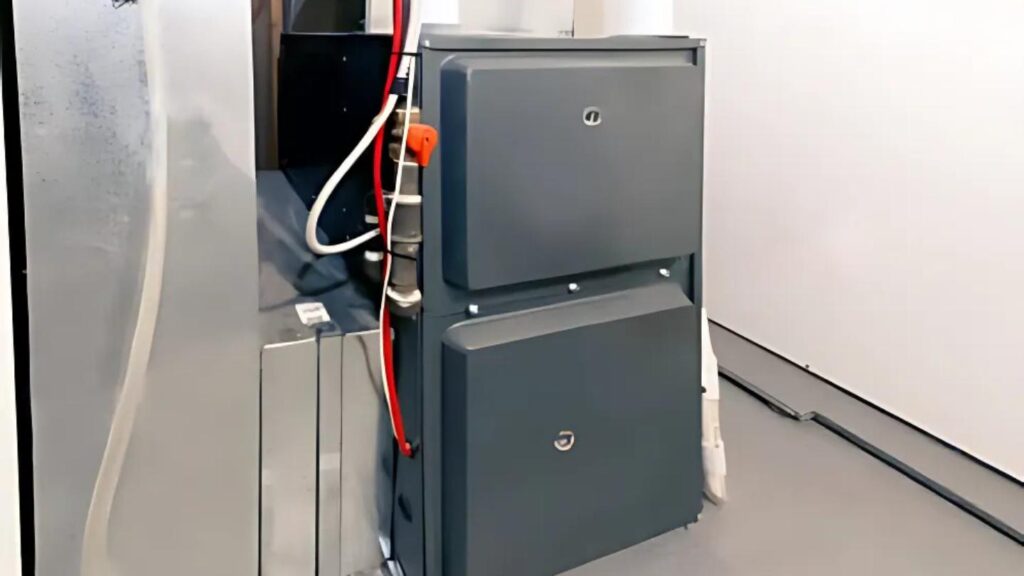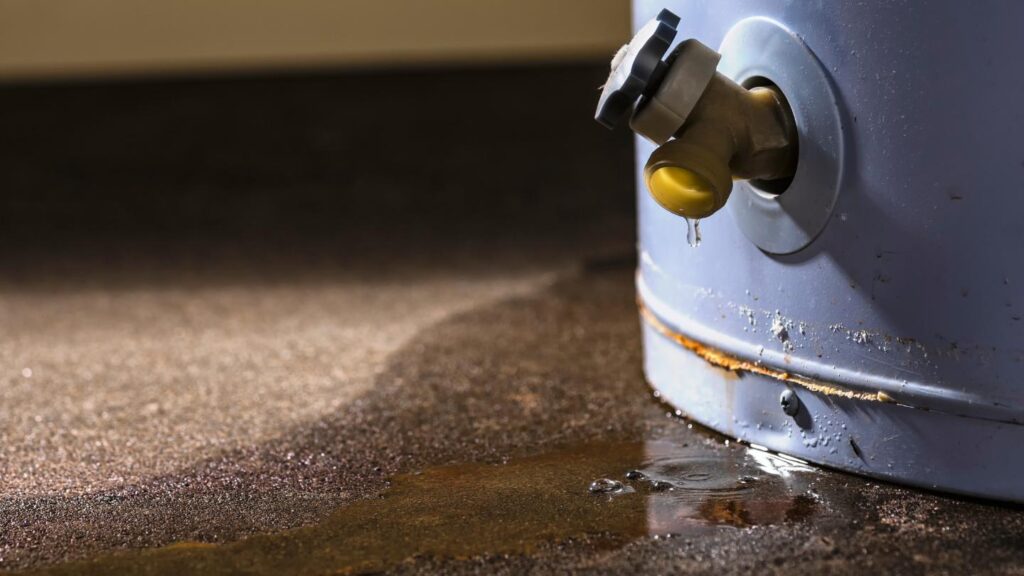Why Is Water Leaking from My Furnace? Top Causes Explained
If you’ve noticed water leaking from your furnace, you’re not alone. A leaking furnace can be caused by various issues, and addressing the problem promptly is crucial to avoid costly repairs. This guide explores why furnaces leak water and how to fix these common problems.
Key Takeaways
- Promptly address any furnace leaking water to prevent costly repairs and further damage.
- Regular maintenance and inspections by HVAC professionals can help prevent future furnace leaks.
- Understanding the type of furnace you have is crucial for diagnosing and fixing furnace leaks effectively.
Understanding Your Furnace
A gas furnace operates by using natural gas or propane to generate heat for your home. Here’s a simplified breakdown of the process:
- Air Intake: The furnace draws in air from the surrounding environment.
- Combustion: The air is mixed with fuel (natural gas or propane) and ignited, producing heat.
- Heat Exchange: The generated heat is transferred to a heat exchanger, which warms the air.
- Air Distribution: The warmed air is then distributed throughout your home via a network of ducts.
High-efficiency furnaces, also known as condensing furnaces, produce water as a byproduct of the combustion process. This occurs because they utilize a secondary heat exchanger to extract additional heat from the exhaust gases, resulting in condensation. The condensation is then directed away through a condensate drain hose or floor drain.
In contrast, conventional furnaces do not produce water since they lack a secondary heat exchanger. Understanding these differences is crucial in diagnosing and addressing furnace leaks.
Identifying the Type of Furnace: High-Efficiency or Conventional?

Understanding your furnace type is the first step in diagnosing the issue. Furnaces typically fall into two categories:
The Annual Fuel Utilization Efficiency (AFUE) rating is crucial for evaluating furnace types. This rating measures how efficiently a furnace converts energy to heat, with high-efficiency models achieving ratings of 90% or above.
High-Efficiency Condensing Furnace
- How it works: These furnaces use a secondary heat exchanger to extract additional heat from exhaust gases. This process produces condensation, which must drain properly to avoid leaks.
- Identifying features: High-efficiency furnaces often have a PVC exhaust pipe instead of a metal one, which indicates their energy efficiency.
Conventional Furnace
- How it works: Conventional furnaces lack a secondary heat exchanger and do not produce condensation during operation.
- Identifying features: These furnaces use a metal exhaust pipe to vent gases. Any water leaks are typically unrelated to condensation.
Common Causes of Furnace Leaks and Fixes
For High-Efficiency Furnaces
- Clogged Condensate Drain Hose: A blocked condensate drain line in a high-efficiency furnace prevents water from draining correctly, causing it to pool near the furnace unit.
- Malfunctioning Condensate Pump: If the condensate pump stops working or becomes clogged, water will back up and leak.
- Cracked Inducer Assembly: Cracks in the inducer assembly can lead to water leaks, especially during the heating cycle.
For Conventional Furnaces
- Humidifier Problems: A damaged humidifier or cracked water lines can result in water leaks near the furnace.
- Poorly Designed Vent Pipe: A metal exhaust pipe that traps warm air can cause condensation, leading to water leaks.
Other Potential Sources of Water Leaks
- Air Conditioner Drain Line: A clogged AC unit drain line can result in water pooling near the furnace. Our technicians can clean the drain line to avoid this issue.
- Evaporator Coil: Issues with the evaporator coil in air conditioning units can lead to water leakage near the furnace. Trust our team to address problems such as freezing or condensation that cause the drain pan to overflow.
- Water Heater: Leaks from a nearby water heater can mimic furnace water leaks. Our experts will check for loose valves or cracks in the tank.
- Damaged Drain Pan: Cracks or holes in the secondary drain pan can lead to water leakage. Our professionals can replace the pan if necessary.
Safety Concerns and Precautions
A furnace leak can pose several safety risks, especially if not addressed promptly. Here are some potential dangers:
- Electrical Shock: Water and electricity are a hazardous combination. If the leak occurs near electrical components, it can cause a short circuit or even an electrical shock.
- Mold and Mildew: Excess moisture from a furnace leak can lead to mold and mildew growth, which can cause health issues and unpleasant odors.
- Structural Damage: Persistent water leaks can weaken the structural integrity of your home, leading to costly repairs.
Steps to Take When Your Furnace Is Leaking Water

- Turn Off the Furnace: Locate the furnace switch or breaker to stop the system and prevent further water damage. This ensures safety and minimizes potential issues.
- Contact Our Professional HVAC Technicians: Reach out to us for expert furnace repair services. Our skilled team will quickly diagnose and resolve the issue, ensuring your system is back to optimal performance.
- Clean Up Excess Water: While waiting for our technicians, you can carefully remove any standing water near the furnace to prevent damage to surrounding areas. However, leave the technical repairs to our experts.
- Schedule Routine Maintenance: After addressing the immediate issue, consider scheduling regular maintenance with our team to prevent future leaks and keep your heating and cooling systems running efficiently.
Repairing a Furnace Leak
Repairing a furnace leak requires identifying the source of the leak and addressing the underlying issue. Here are some common causes and the professional solutions we offer:
- Clogged Condensate Drain Hose: A blocked condensate drain hose can prevent water from draining properly, leading to leaks. Our skilled technicians will thoroughly inspect and clean the hose, ensuring optimal water flow and preventing future blockages.
- Faulty Condensate Pump: If the condensate pump is malfunctioning, it can cause water to back up and leak. Our team will examine the pump for any signs of wear or damage and replace it with precision to restore your system’s functionality.
- Cracked Heat Exchanger: A cracked heat exchanger can lead to water leaks. Our experts will conduct a detailed inspection to identify any cracks or damage and provide a professional replacement to ensure safety and efficiency.
While some minor issues might seem manageable with DIY repairs, we strongly recommend hiring our professional HVAC technicians for a comprehensive diagnosis and repair. This approach guarantees that the issue is resolved effectively and safely, giving you peace of mind and preventing costly future repairs.
Read more: Top 7 Signs Your Furnace Is Going Out and Needs Repair
Preventing Future Furnace Leaks with Professional Maintenance
Ensuring your furnace remains leak-free is best achieved through professional routine maintenance. Our expert HVAC technicians can conduct regular inspections and timely repairs, addressing potential issues before they escalate. During maintenance, we thoroughly inspect the primary heat exchanger to ensure it functions properly, preventing future leaks.
- Schedule routine maintenance with our experienced team for your heating and cooling systems, including the air conditioning and furnace unit.
- Allow our technicians to clean the condensate drain and condensate trap to prevent clogs effectively.
- Trust us to monitor the humidifier and water lines for any signs of leaks or damage.
- Rely on our experts to inspect the condensate pump and secondary drain pan for wear and tear, ensuring optimal system performance.
Conclusion
In conclusion, addressing a furnace leaking water promptly is essential to prevent further damage and costly repairs. By understanding the common causes of furnace leaks and taking the necessary steps to fix them, you can ensure your heating and cooling systems operate efficiently. Regular maintenance and timely repairs are crucial for keeping your furnace in top condition.
At Total Comfort Cooling & Heating Inc., we are dedicated to providing exceptional HVAC services for Venice residents. Our experienced HVAC technicians specialize in furnace repairs, maintenance, and inspections, helping you prevent costly issues and maintain peak system performance. Don’t wait for problems to escalate—contact us today to ensure your HVAC system runs smoothly and efficiently!
Frequently Asked Questions
What should I do if my furnace is leaking water?
Turn off the furnace, clean up any water, check the air filter, and contact an HVAC professional for repairs.
How can I prevent furnace leaks in the future?
Routine maintenance, regular inspections, and keeping the condensate drain line clear can help prevent water leaks.
READY FOR YOUR NEXT HEATING OR COOLING PROJECT?
Contact us to get a quote and see why our customer service is recognized as the best in the industry.




